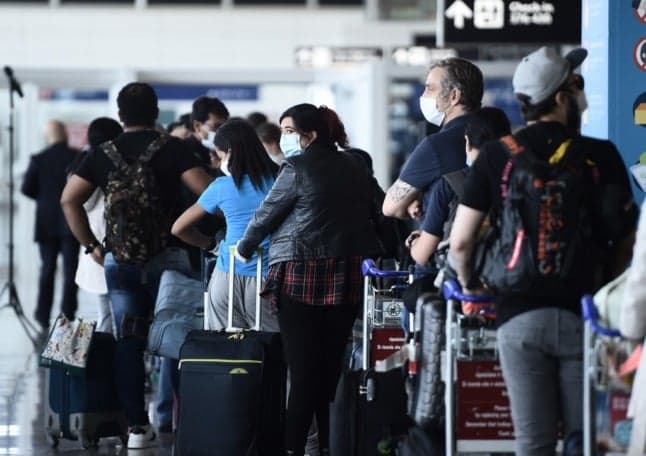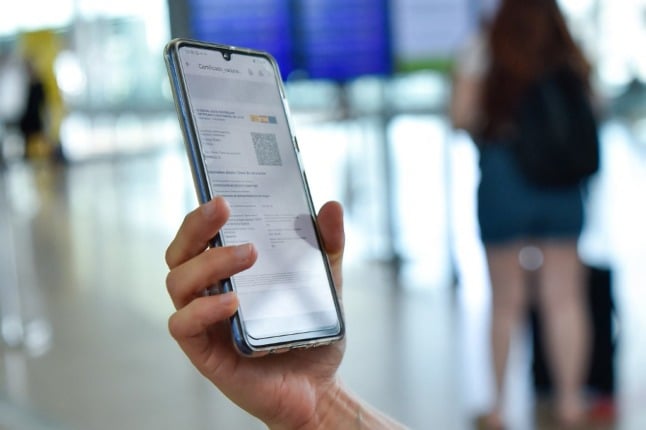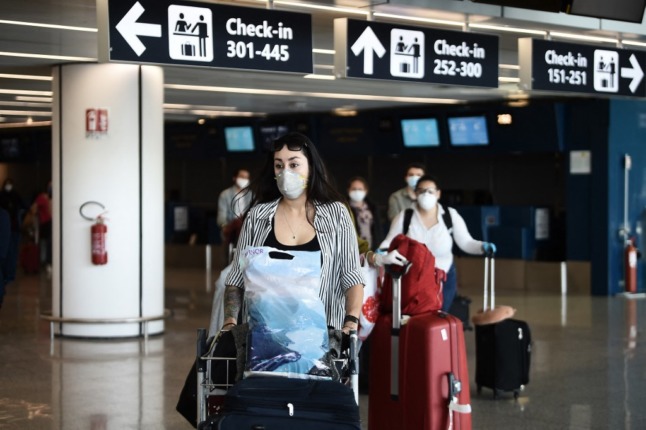EXPLAINED: How Italy’s travel rules change in March

As Italy has relaxed its Covid rules for non-EU arrivals from March, here's a closer look at the changes.
As of March 1st, arrivals from outside the EU no longer need to show both proof of vaccination against or recovery from Covid and a negative test result.
Either a vaccination certificate, recovery certificate or negative test result is now sufficient for entry to Italy.
The relaxation of the rules, which is hoped to boost Italy's tourism sector following two years of Covid restrictions, means travel restrictions for non-EU travellers are now the same as for those coming from within Europe following a change to those rules in February.
The health ministry last week published a statement confirming that "with effect from March 1st, the same rules for arrivals to Italy from all non-European countries as those already in force for European countries."
The ordinance containing the new set of rules is available online here.
Here's a closer look at what the rules entail.
Paperwork to enter Italy
Just one of the following is now required for all non-EU arrivals: a vaccination certificate, certificate of recovery or a negative test result, the health ministry's update states.
This follows Italy's introduction of the same rule for EU arrivals on February 1st.
Therefore, vaccinated and recovered travellers won't need to get tested as well for travel to Italy - though this still currently the rule until Monday, February 28th.
It also means unvaccinated travellers and those not recovered from Covid-19 will be able to enter Italy with just proof of a negative test.

Italy's travel rules will be simplified for non-EU arrivals from next month. Photo by Pau BARRENA / AFP
The change applies to travellers from outside the EU, such as those from the UK, US, Canada, New Zealand, Israel and Japan, for instance.
Passengers can present certificates of recovery, vaccination or testing in digital or paper format.
You also still need to complete a digital passenger locator form (dPLF) - find the instructions and download link here.
READ ALSO: UK ends Covid test requirements for fully-vaccinated travellers
As before, the dPLF must be completed by everyone arriving in Italy, by any means of transport, before entering the country. It can also be completed and shown in either paper or digital format.
Some exemptions apply, such as to those transiting through Italian airports to another country or to students attending a course in a country other than the country of residence, for instance.
The rules will continue to be enforced by airlines upon boarding: the new Italian ordinance specifies that carriers must check the dPLF and that travellers have one of the required entry certifications before boarding.
Carriers are also obliged to deny boarding to those who show Covid-19 symptoms.
Quarantine rules lifted
There's no isolation period for non-EU arrivals. Quarantine on arrival only applies if you fail to produce the required documents.
In this case, you'd need to isolate at the address you listed on the digital Passenger Locator Form for five days, followed by a molecular or antigenic swab at the end of this period.
This includes those arriving from ‘List E’ countries, who were previously subject to a 10-day quarantine on arrival and only permitted to enter Italy for 'essential' reasons.
The updated guidance on the foreign ministry's Viaggiare Sicuri (Travel Safe) website confirms that the new rules eliminate country lists and do away with the specific travel restrictions that applied to countries on the former List E.
Children under the age of six are exempt from testing requirements, according to the ordinance text.

No travellers will need to quarantine on arrival in Italy as long as they can show the required documentation. (Photo by Filippo MONTEFORTE / AFP)
What types of certificate are valid?
On March 1st, the foreign ministry updated its guidance to clarify what counts as "vaccinated" for entry purposes.
According to the Viaggiare Sicuri website, this is either:
- A completed primary vaccination cycle with an EMA-approved vaccine carried out less than nine months ago, or
- A completed primary vaccination cycle plus booster dose with EMA-approved vaccines, carried out at any time.
Italy's move followed a recommendation on Tuesday from the EU council, made up of member states, that all countries "should lift the temporary restrictions on non-essential travel to the EU for people vaccinated with an EU or WHO approved vaccine, provided they have received the last dose of the primary vaccination cycle at least 14 days ago and no more than 270 days prior to arrival, or have received a booster dose."
Travellers without valid vaccination certificates can enter Italy with either a recovery certificate or a recent negative Covid test.
To be valid for entry, the recovery certificate should show proof from a certified medical provider that the holder has recovered from Covid within the past six months.
Both rapid antigen/lateral flow and PCR/molecular Covid tests are valid for entry into Italy; PCR tests must have been taken in the 72 hour window before arrival in Italy and rapid tests in the 48 hours before arrival.
The new ordinance confirms that either digital or paper certificates are valid for entry to Italy.
Passengers who fail to present any one of these documents will still be allowed to enter the country, but will be required to self isolate for five days on arrival and test negative for Covid on day five to exit quarantine.
The rules once you're in Italy
The change from March 1st applies only to the rules when entering Italy. Travellers should be aware that a different, stricter set of measures is in force within the country.
Italy has recently expanded the use of its domestic ‘green pass’ proving vaccination, testing or recovery.
So, even though you may enter Italy with just a negative test, once you're here you'll need to be either vaccinated or recovered to access everything from hotels and restaurants to public transport under rules set to stay in force until at least March 31st.
The so-called 'basic green pass' (green pass base) obtained via a negative swab is restricted to shops, public offices and hairdressers, for example. Therefore, it's not enough for travelling to Italy for tourism and all that entails - like staying in hotels and dining in restaurants.
Boarding a train or domestic flight in Italy is not currently allowed without proof of vaccination or recovery.
There are no restrictions for tourists travelling to the independent states of San Marino and Vatican City once in Italy.
READ ALSO:
- At a glance: What are the Covid-19 rules in Italy now?
- How Italy has updated its Covid health pass rules for visitors
- EXPLAINED: Where you now need to show a Covid green pass in Italy
Travellers from any other European member state can show their country’s version of the green pass, or health pass – which is recognised on par with Italy’s – to gain access to all venues where it is required.
Italy also recently announced special exceptions for some non-EU tourists meaning they may not have to show the same proof of vaccination as residents.
Will the rules be extended past March?
The new set of rules will remain valid until March 31st, according to the ordinance text.
It appears unlikely that the rules will be tightened again after that - at least ahead of the summer tourist season.
"I think the ordinance gives an important signal to the tourism sector. We have in fact lifted the quarantine for all those arriving in our country from any country," Health Undersecretary Andrea Costa told Sky TG24 news.
"For a country like Italy where the tourism sector is a fundamental element, it means being able to plan. And this is certainly a positive sign," he added.
For further details about Italy’s current Covid-19 health measures please see the Italian health ministry website (available in English).
Comments
See Also
As of March 1st, arrivals from outside the EU no longer need to show both proof of vaccination against or recovery from Covid and a negative test result.
Either a vaccination certificate, recovery certificate or negative test result is now sufficient for entry to Italy.
The relaxation of the rules, which is hoped to boost Italy's tourism sector following two years of Covid restrictions, means travel restrictions for non-EU travellers are now the same as for those coming from within Europe following a change to those rules in February.
The health ministry last week published a statement confirming that "with effect from March 1st, the same rules for arrivals to Italy from all non-European countries as those already in force for European countries."
The ordinance containing the new set of rules is available online here.
Here's a closer look at what the rules entail.
Paperwork to enter Italy
Just one of the following is now required for all non-EU arrivals: a vaccination certificate, certificate of recovery or a negative test result, the health ministry's update states.
This follows Italy's introduction of the same rule for EU arrivals on February 1st.
Therefore, vaccinated and recovered travellers won't need to get tested as well for travel to Italy - though this still currently the rule until Monday, February 28th.
It also means unvaccinated travellers and those not recovered from Covid-19 will be able to enter Italy with just proof of a negative test.

The change applies to travellers from outside the EU, such as those from the UK, US, Canada, New Zealand, Israel and Japan, for instance.
Passengers can present certificates of recovery, vaccination or testing in digital or paper format.
You also still need to complete a digital passenger locator form (dPLF) - find the instructions and download link here.
READ ALSO: UK ends Covid test requirements for fully-vaccinated travellers
As before, the dPLF must be completed by everyone arriving in Italy, by any means of transport, before entering the country. It can also be completed and shown in either paper or digital format.
Some exemptions apply, such as to those transiting through Italian airports to another country or to students attending a course in a country other than the country of residence, for instance.
The rules will continue to be enforced by airlines upon boarding: the new Italian ordinance specifies that carriers must check the dPLF and that travellers have one of the required entry certifications before boarding.
Carriers are also obliged to deny boarding to those who show Covid-19 symptoms.
Quarantine rules lifted
There's no isolation period for non-EU arrivals. Quarantine on arrival only applies if you fail to produce the required documents.
In this case, you'd need to isolate at the address you listed on the digital Passenger Locator Form for five days, followed by a molecular or antigenic swab at the end of this period.
This includes those arriving from ‘List E’ countries, who were previously subject to a 10-day quarantine on arrival and only permitted to enter Italy for 'essential' reasons.
The updated guidance on the foreign ministry's Viaggiare Sicuri (Travel Safe) website confirms that the new rules eliminate country lists and do away with the specific travel restrictions that applied to countries on the former List E.
Children under the age of six are exempt from testing requirements, according to the ordinance text.

What types of certificate are valid?
On March 1st, the foreign ministry updated its guidance to clarify what counts as "vaccinated" for entry purposes.
According to the Viaggiare Sicuri website, this is either:
- A completed primary vaccination cycle with an EMA-approved vaccine carried out less than nine months ago, or
- A completed primary vaccination cycle plus booster dose with EMA-approved vaccines, carried out at any time.
Italy's move followed a recommendation on Tuesday from the EU council, made up of member states, that all countries "should lift the temporary restrictions on non-essential travel to the EU for people vaccinated with an EU or WHO approved vaccine, provided they have received the last dose of the primary vaccination cycle at least 14 days ago and no more than 270 days prior to arrival, or have received a booster dose."
Travellers without valid vaccination certificates can enter Italy with either a recovery certificate or a recent negative Covid test.
To be valid for entry, the recovery certificate should show proof from a certified medical provider that the holder has recovered from Covid within the past six months.
Both rapid antigen/lateral flow and PCR/molecular Covid tests are valid for entry into Italy; PCR tests must have been taken in the 72 hour window before arrival in Italy and rapid tests in the 48 hours before arrival.
The new ordinance confirms that either digital or paper certificates are valid for entry to Italy.
Passengers who fail to present any one of these documents will still be allowed to enter the country, but will be required to self isolate for five days on arrival and test negative for Covid on day five to exit quarantine.
The rules once you're in Italy
The change from March 1st applies only to the rules when entering Italy. Travellers should be aware that a different, stricter set of measures is in force within the country.
Italy has recently expanded the use of its domestic ‘green pass’ proving vaccination, testing or recovery.
So, even though you may enter Italy with just a negative test, once you're here you'll need to be either vaccinated or recovered to access everything from hotels and restaurants to public transport under rules set to stay in force until at least March 31st.
The so-called 'basic green pass' (green pass base) obtained via a negative swab is restricted to shops, public offices and hairdressers, for example. Therefore, it's not enough for travelling to Italy for tourism and all that entails - like staying in hotels and dining in restaurants.
Boarding a train or domestic flight in Italy is not currently allowed without proof of vaccination or recovery.
There are no restrictions for tourists travelling to the independent states of San Marino and Vatican City once in Italy.
READ ALSO:
- At a glance: What are the Covid-19 rules in Italy now?
- How Italy has updated its Covid health pass rules for visitors
- EXPLAINED: Where you now need to show a Covid green pass in Italy
Travellers from any other European member state can show their country’s version of the green pass, or health pass – which is recognised on par with Italy’s – to gain access to all venues where it is required.
Italy also recently announced special exceptions for some non-EU tourists meaning they may not have to show the same proof of vaccination as residents.
Will the rules be extended past March?
The new set of rules will remain valid until March 31st, according to the ordinance text.
It appears unlikely that the rules will be tightened again after that - at least ahead of the summer tourist season.
"I think the ordinance gives an important signal to the tourism sector. We have in fact lifted the quarantine for all those arriving in our country from any country," Health Undersecretary Andrea Costa told Sky TG24 news.
"For a country like Italy where the tourism sector is a fundamental element, it means being able to plan. And this is certainly a positive sign," he added.
For further details about Italy’s current Covid-19 health measures please see the Italian health ministry website (available in English).
Join the conversation in our comments section below. Share your own views and experience and if you have a question or suggestion for our journalists then email us at [email protected].
Please keep comments civil, constructive and on topic – and make sure to read our terms of use before getting involved.
Please log in here to leave a comment.